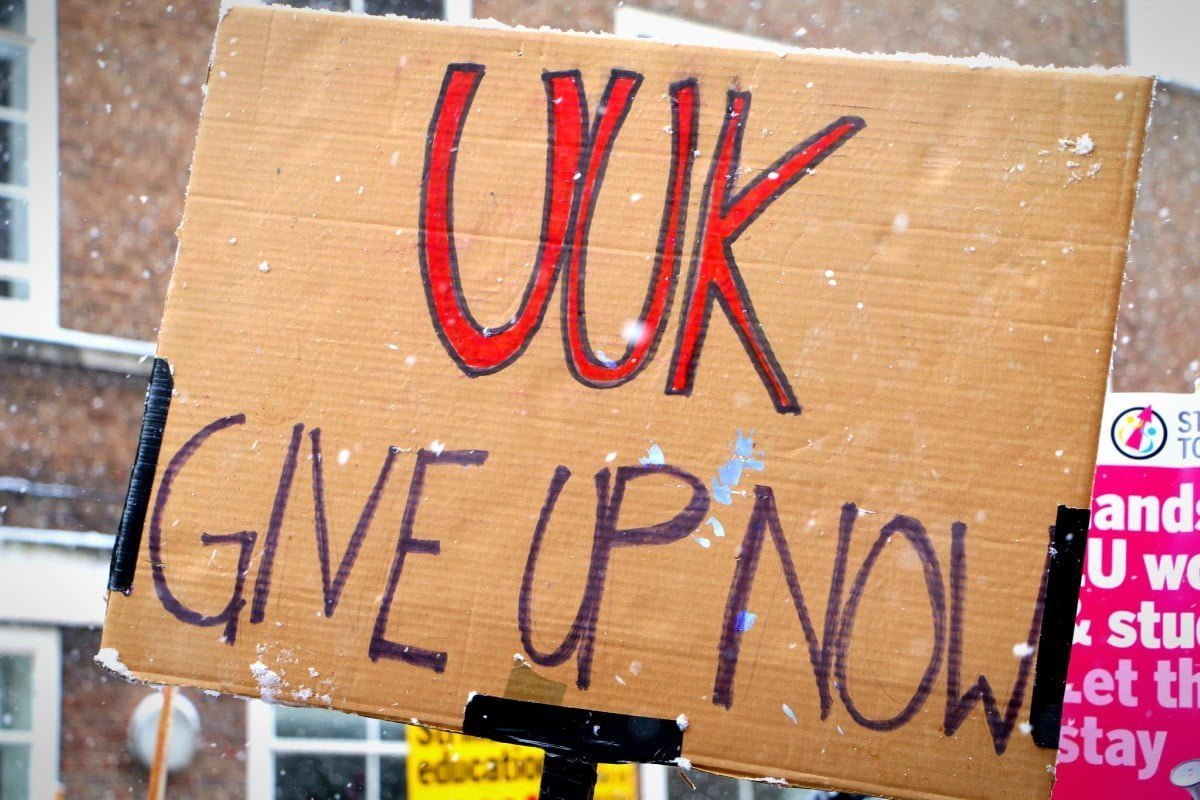In advance of today’s negotiations between the UCU and UUK, Joe Attard calls on academic staff to accept no compromises over pension cuts. The UCU strike remains strong. Push forward to victory!
Over the past two weeks, university staff all over the country have braved freezing weather, bullying tactics from management and attempted press smears, to strike in defence of their pensions.
In the space of five days of action, we’ve completely transformed the situation: students have turned up in force and the Universities UK is on the run. And now Unison members are joining us in demonstrations and on the pickets, while Further Education college staff have overwhelmingly balloted for strike action over pay reductions.
We have shown beyond any shadow of doubt that strikes work. Under the pressure of our action, the UUK has done a 180-degree inversion on its hardline position and has committed to meaningful negotiations without preconditions, and to arbitration.
No compromises
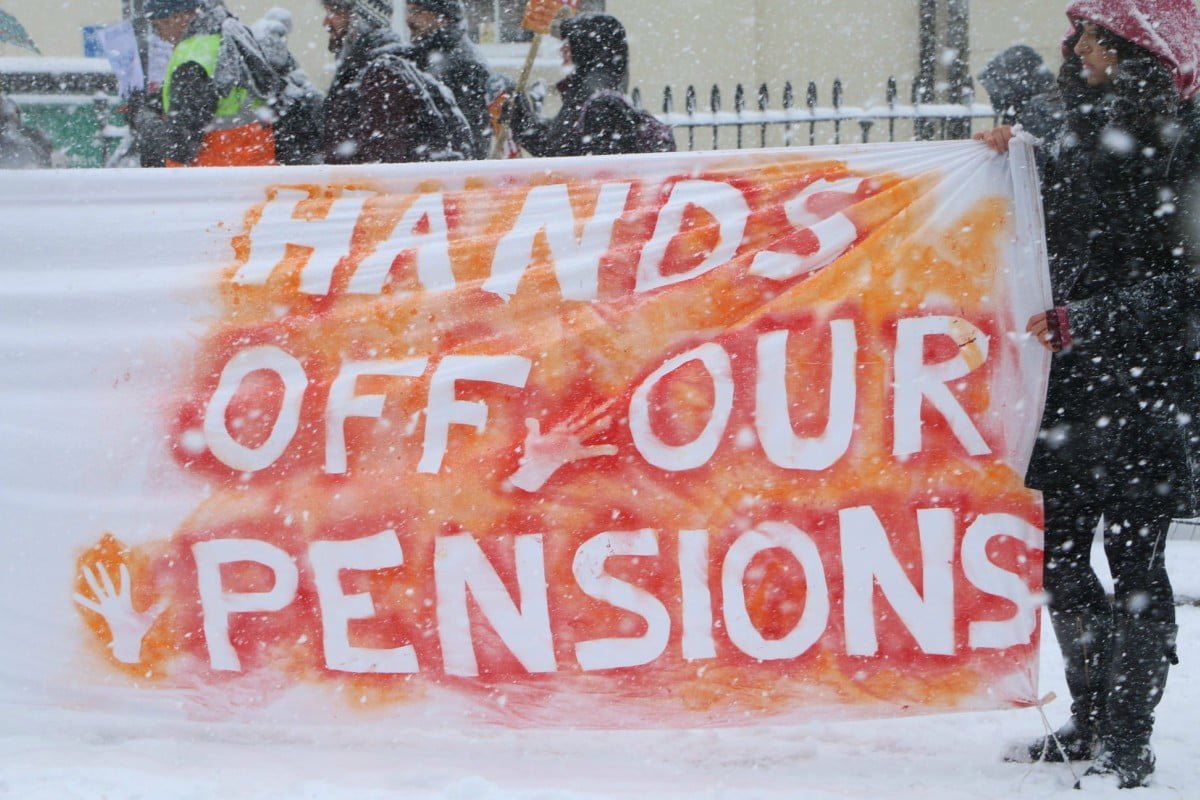 Ahead of today’s negotiations, the UCU has contacted members with a proposal that we retain defined benefit at the cost of a “modest” increase in contributions.
Ahead of today’s negotiations, the UCU has contacted members with a proposal that we retain defined benefit at the cost of a “modest” increase in contributions.
Retaining defined benefit will undoubtedly be a victory for workers, and a defeat for the exploiters. We will have succeeded where other public sector workers (including nurses and doctors) were sadly defeated in beating back an unconscionable attack on our profession.
But if the UUK accepts our compromise, which demands higher contributions and more risk for employees, then we are still swallowing a pension cut. Meanwhile, vice-chancellors will continue to reward themselves with six-figure salaries, courtesy of extortionate student fees. Not to mention the fact that retreating from the picket lines will take the momentum out of our FE colleagues’ action, and undercut attempts by Unison members to stand up for their interests.
The pension scheme I signed up for (and into which I have only lately started paying) will still be damaged under the current proposal. Given the attacks our sector has endured over the past several years, we should accept nothing less than a complete withdrawal of UUK’s proposal. And if they say they cannot afford defined benefit with our current contributions, then we should fight alongside other university workers to remove the overpaid deadweights that we call management (and who continually bring our sector into disrepute with their outrageous pay packets), and run the HE sector ourselves.
Given the strength of the strike thus far, we have no reason to settle for anything less than total victory: no change whatsoever to our pensions.
Solidarity
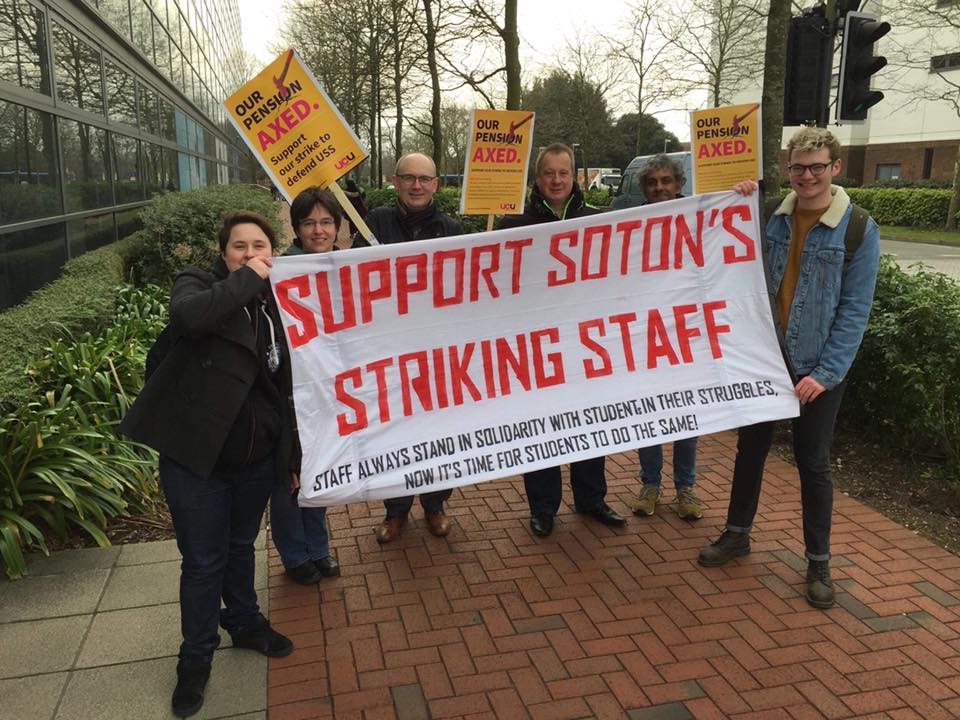 This has been a hugely successful action, in which students and staff have demonstrated an enormous degree of radical energy and turned picket lines into vibrant centres of learning through teach-outs and teach-ins – all on our own terms.
This has been a hugely successful action, in which students and staff have demonstrated an enormous degree of radical energy and turned picket lines into vibrant centres of learning through teach-outs and teach-ins – all on our own terms.
Despite attempts by the right-wing press to drive a wedge between students and staff by constantly reiterating the financial ‘cost’ of our strike as a percentage of fees (which mostly don’t go to teaching regardless), the National Union of Students has offered us solidarity. Local student unions all over the country have followed suit, and thousands of students have turned up to picket lines to show their support. The Times Higher Education Supplement confirms that most students see the bigger picture, and recognise that the UUK’s attack on pensions is only part of a wider process in which our campuses are being turned into businesses.
We all know the attack on the USS is not an isolated issue: it is just one more step along the road to total marketisation of education. This can be felt acutely in the form of extortionate student fees (especially for international students); endless and enormously expensive development projects; an unbearable pressure to meet research targets; a 15 percent pay cut for staff over the past decade; and the widespread adoption of precarious teaching contracts – the JD Sports model of academia.
Our own figures reveal the rampancy of casualisation in the HE sector. I myself am a Graduate Teaching assistant – one of the silent workhorses of my university – scraping by on three jobs while writing up my thesis. When I submit, the future facing me is one of grinding fixed-term contracts and only the very distant prospect of meaningful employment. It is people like me, starting academics, who stand to lose most from the counter-reform to pensions, and who will still bear the brunt of any compromise in the form of higher contributions and reduced security.
Get rid of the fat cats
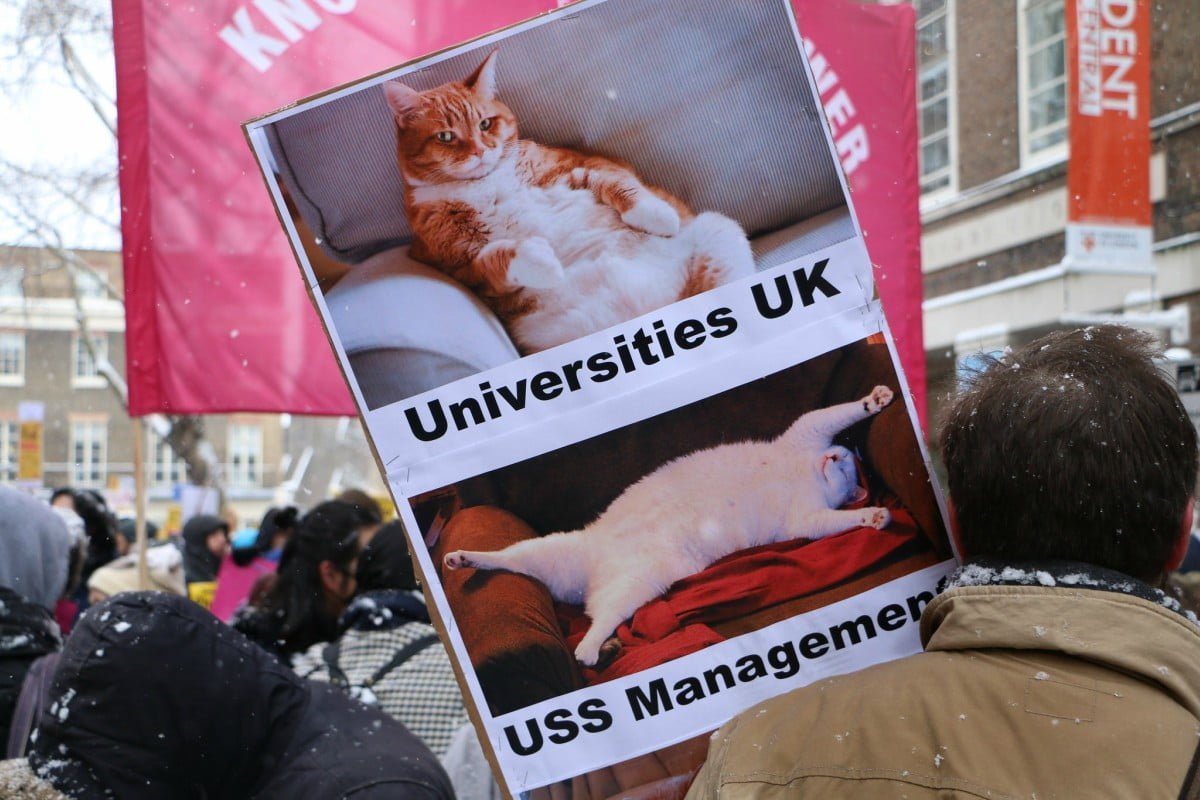 While frontline workers are paid less and students pay more, senior management reap the riches. Labour analysis of data published by the Times Higher Education Supplement shows that from 2010-11 to 2016-17, vice-chancellors’ benefits packages increased by 227 percent.
While frontline workers are paid less and students pay more, senior management reap the riches. Labour analysis of data published by the Times Higher Education Supplement shows that from 2010-11 to 2016-17, vice-chancellors’ benefits packages increased by 227 percent.
My own principal (Ed Byrne of King’s College London) was found by a UCU FOI request to have earned £458,000 in 2014/5 – and that is besides expenses on first-class flights and five-star accommodation. He subsequently took his colleagues to court (to the tune of £250,000, paid for out of students’ fees) to prevent the income of our senior leadership team being made public. Even Theresa May has attacked the sickening hypocrisy of Vice-Chancellors who reward themselves handsomely while attempting to slash their colleagues’ pensions.
This is all without mentioning the impact of marketisation on students. Between the burden of debt, uncertainty over future employment prospects, racist surveillance laws, and abysmally expensive (and often simply abysmal) accommodation, it is little wonder that our student body is wracked by a mental health crisis. Every lecturer could cite examples of students who have crashed out of higher education altogether under the pressure of stress and anxiety.
These are the same students who have joined us in solidarity – with nothing whatsoever to gain from our dispute – and occupied their universities in protest at attacks on their teachers. The level of maturity and political acuity shown by our students over this dispute has been exceptional.
Unite and fight
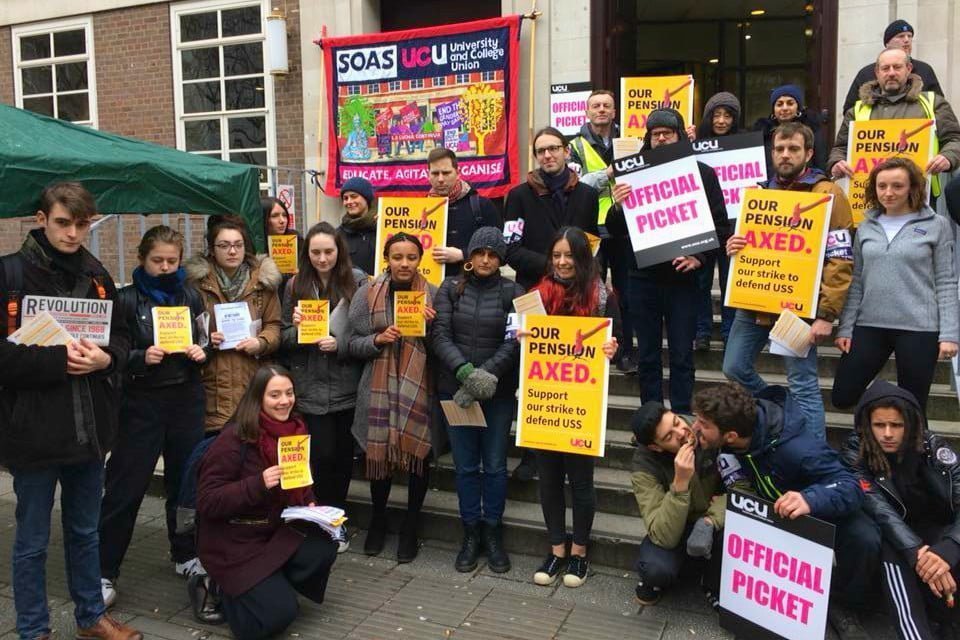 All across the sector, underpaid, overworked and often outsourced support staff (cleaners, porters, security teams administrators and so on) have been fighting against neglect and abuse from management. Outsourced cleaners at my university are currently struggling for the right to have pensions at all!
All across the sector, underpaid, overworked and often outsourced support staff (cleaners, porters, security teams administrators and so on) have been fighting against neglect and abuse from management. Outsourced cleaners at my university are currently struggling for the right to have pensions at all!
Now our colleagues on campus are gearing up to join our struggle. Having helped organise a joint UCU/Unison demonstration at King’s, I have seen the capacity of lecturers and support workers, united for their common interests, to bring our institutions to a standstill. For a few hours on our second day of picketing, the university ground to a halt as we all withdrew our labour.
Thanks to this cross-union solidarity and student support, staff have developed a level of confidence I’ve never seen during any UCU action in the past. We can afford to be bold. Already, there has been a joint motion of no confidence in management passed at both the student union and local UCU branch at University Colleges London. We should repeat this on a national stage for the entire vice-chancellery.
We have a golden opportunity to link with other education workers and fight for a much more fundamental change in society. We have a mandate for six months of action: imagine if we re-balloted to extend the strike’s remit to cover pay, casualisation and marketisation. Unison is in dispute up and down the country, and FE colleges are already striking over pay.
Imagine if teachers at universities and colleges stood firm with support staff, for as long as it took to win all of our demands. Universities would have to reschedule academic years, and current students would rightly expect free re-sits for an entire term, which would put the issue of free education back on the agenda.
Moreover, there is every chance our example could reignite action by nurses, doctors, firefighters, civil servants and other public sector workers who have seen their pay capped by the Tories.
Bring down the Tories!
All throughout Britain, ordinary people are being made to pay for an economic nightmare they did not create. The £6bn projected hole the UUK identified (however spuriously) in the Universal Superannuation Scheme stems from the historically low yields of UK government bonds, which in turn results from the quantitative easing that dragged capitalism out of the 2008 recession.
This is veiled austerity. As ever, it is ordinary workers who have to pay the tab on the bankers’ behalf. We should unite in opposition to this injustice, and to the right-wing politicians that abet it.
John McDonnell recently said at a Goldsmiths’ teach-in that this strike could bring down the government. I happen to think he has a point. What we have seen developing on campuses is the germ of a public sector-wide strike: one with the potential to bring the Conservatives to their knees.
The weakness of May’s administration is evidenced by its tepid stance on this strike. Universities minister Sam Gyimah called on the UUK to acquiesce to talks after a handful of strike days. Contrast this with the bullishness with which Jeremy Hunt battled the junior doctors in 2016.
Rest assured, the Tories have not been moved to declare sympathy with striking staff out of the goodness of their hearts. The government is in a desperately weakened position following the Tories’ disastrous performance at the last general election. The Tories lack the confidence to back their capitalist cronies over this issue, given the firm pushback from workers and students. The Conservatives should be spared no mercy: they and their friends in the UUK are responsible for this mess.
Against privatisation, marketisation, and exploitation
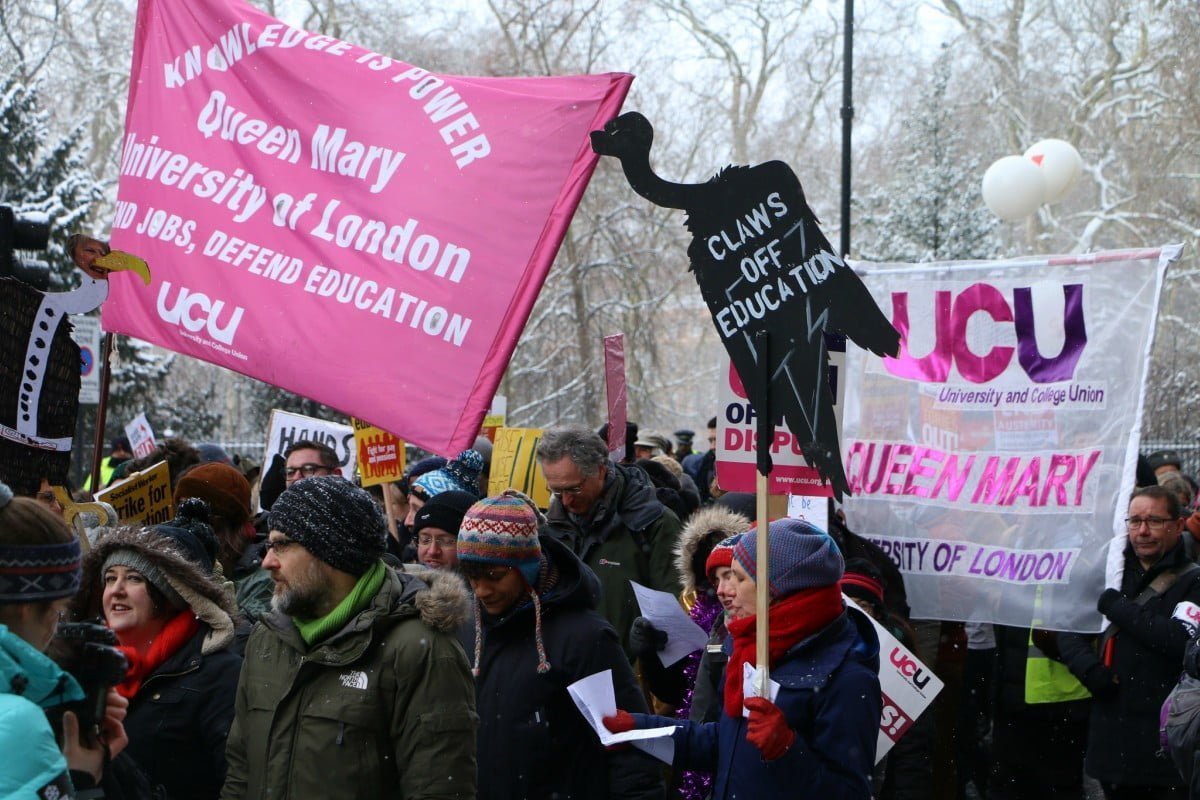 If the UUK negotiators dig their heels in, UCU should join with other public sector unions and mobilise for a general opposition to privatisation and marketisation of public services. The union should reach out to students by framing our dispute as part of a wider fightback against the commodification of education, and a struggle for free education, provided on the basis of a democratic, socialist society.
If the UUK negotiators dig their heels in, UCU should join with other public sector unions and mobilise for a general opposition to privatisation and marketisation of public services. The union should reach out to students by framing our dispute as part of a wider fightback against the commodification of education, and a struggle for free education, provided on the basis of a democratic, socialist society.
The NUS, for its part, should take advantage of huge student support for staff and bring its membership out onto the streets to keep fighting until this vision is achieved. Moreover, the Labour Party should build upon the support it has shown and give political leadership to this movement – putting into practice Corbyn’s promise for free, cradle-to-grave education for all.
Throughout this strike, staff and students have gained a sense of their collective power. At my university, only 11 percent of classes have gone ahead on strike days. We have demonstrated in the eyes of the world that, without the permission of education workers, the education system cannot function.
That same logic applies to every facet of society. The 50 year anniversary of the student and worker-led struggle of May 1968 in France feels like a fitting moment to stake a claim for a society run democratically in the interests of the majority. One in which education is respected as a public good, not a profit-driven enterprise run in the interests of the rich.
I have been proud to strike alongside my colleagues, and our achievements are considerable. But we all know this isn’t just about pensions. The fact is, education will never be safe with the Conservatives in power. I want to save the education sector from exploitation: I want it to be free, and I want education workers paid decently, employed reliably, and promised security in old age. And the amazing thing is, that looks now perfectly achievable – but only if we push harder.
Below is a motion that is being presented to an Emergency General Meeting of the KCL UCU branch, based on the open letter above. All UCU comrades should attempt to pass similar motions, and students should pass solidarity resolutions in student unions and student societies.
UCU: No pension cuts! Fight marketisation! Bring down the Tories!
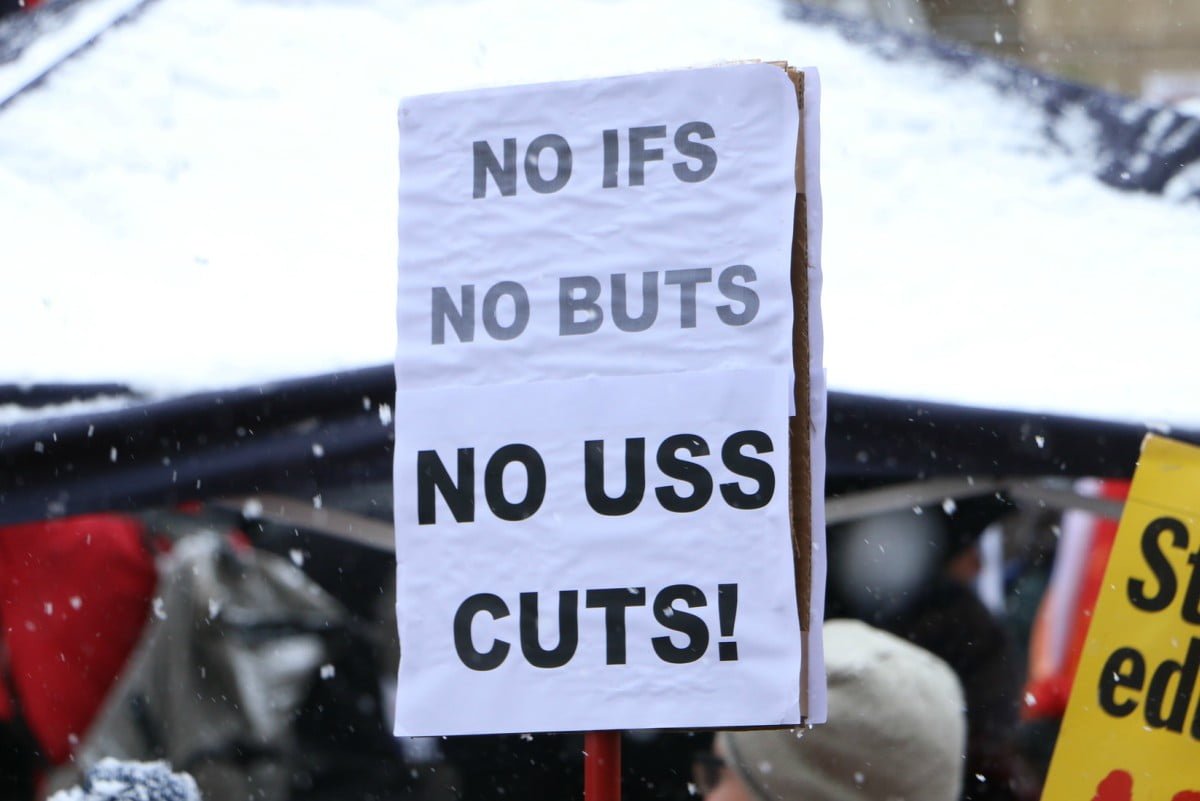 This branch notes that:
This branch notes that:
- Over the past weeks, university staff all over the country have braved freezing weather and bullying tactics from management to strike in defence of their pensions.
- In the space of five days of action, we’ve affected a complete transformation of the situation: the UUK has done a 180-degree inversion on its hard-line position and has committed to meaningful negotiations without preconditions, and to arbitration.
- Unison members have also passed motions of solidarity with the UCU and has participated in joint demonstrations.
- Further Education college staff have overwhelmingly balloted for strike action over pay reductions.
- Over 60% of students support our action, and only 2% blame us for the disruption.
- Ahead of negotiations on Monday, the UCU has contacted members with a proposal that we retain defined benefit at the cost of a “modest” increase in contributions. The new proposal would mean contributions would increase by just 4.1% (split 65/35 between employers and employees) rather than the 8.3% estimated cost of UCU’s previous proposal – an increase in contributions of 2.7% for employers and 1.4% for USS members.
This branch believes that:
- Retaining defined benefit will undoubtedly be a victory for workers, and a defeat for the exploiters. We will have succeeded where other public-sector workers (including nurses and doctors) were sadly defeated in beating back an unconscionable attack on our profession.
- If the UUK accepts the suggested compromise, which demands higher contributions and more risk for employees, then we are still swallowing a pension cut, and vice-chancellors will continue to reward themselves with six-figure salaries, courtesy of extortionate student fees.
- This cut would disproportionately affect starting lecturers who have only just begun paying into the pension scheme.
- Retreating from the picket lines will take the momentum out of our FE colleagues’ action, and undercut attempts by Unison members to stand up for their interests.
- Thanks to this cross-union solidarity and student support, UCU members have developed a level of confidence never seen during any action in the past.
- Given the strength of the strike thus far, we have no reason to settle for anything less than total victory and no change whatsoever to our pensions.
This branch further believes:
- We all know the attack on the USS is not an isolated issue: it is just one more step along the road to total marketisation of education. This can be felt acutely in the form of extortionate student fees (especially for international students), endless and enormously expensive development projects, an unbearable pressure to meet research targets, a 15 percent pay cut for staff over the past decade and the widespread adoption of precarious teaching contracts.
- We have successfully reached out to students with a big picture, political message, presenting the counter-reform to USS as part of a wider fightback against marketisation. Between the burden of debt, uncertainty over future employment prospects, racist surveillance laws and abysmally expensive (and often simply abysmal) accommodation, it is little wonder that our student body is wracked by a mental health crisis. Every lecturer could cite examples of students who have crashed out of academia altogether under the pressure of stress and anxiety. These are the same students who have joined us in solidarity – with nothing whatsoever to gain from our dispute – and occupied their universities in protest at attacks on their teachers.
- We have a golden opportunity to link with other education workers and fight for a much more fundamental change in society. What we have seen developing on campuses is the germ of a public sector-wide strike: one with the potential to bring the Conservatives to their knees. The weakness of May’s administration is evidenced by its tepid stance on this strike. Universities minister Sam Gyimah called on the UUK to acquiesce to talks after a handful of strike days: contrast this with the bullishness with which Jeremy Hunt battled the junior doctors in 2016.
- Rest assured, the Tories have not been moved to declare sympathy with striking staff out of the goodness of their hearts. The government is in a desperately weakened position following the Tories’ disastrous performance at the last general election. The Tories lack the confidence to back their Vice-Chancellor cronies over this issue, given the firm pushback from workers and students.
This branch resolves to:
- Appeal to UCU negotiators not to accept a single pension cut. The USS pension scheme should remain as it is, or the strikes should continue.
- If the UUK refuses in, UCU should re-ballot members to extend the remit of the strike. We should mobilise for a general opposition to privatisation and marketisation of public services.
- To join with other public-sector workers currently in dispute and preparing for action: including colleagues at FE colleges and in Unison.
- To reach out to students by framing our struggle as part of a wider fightback against the commodification of education, and a struggle for free education.
- Build collectively for a public-sector wide strike, one with the potential to bring this weakened Tory government to an end.

